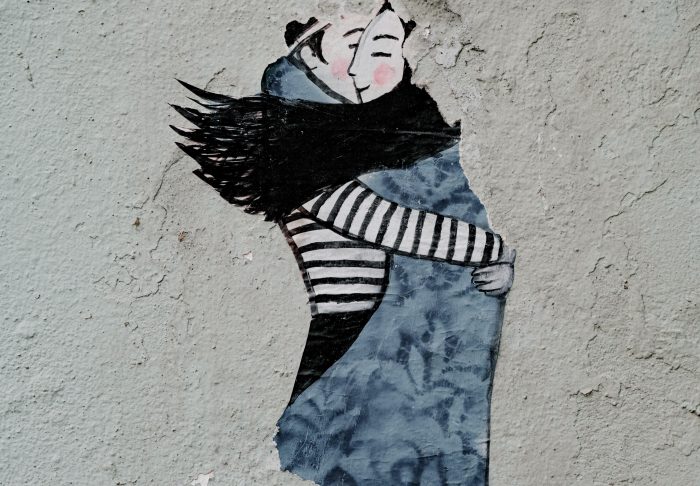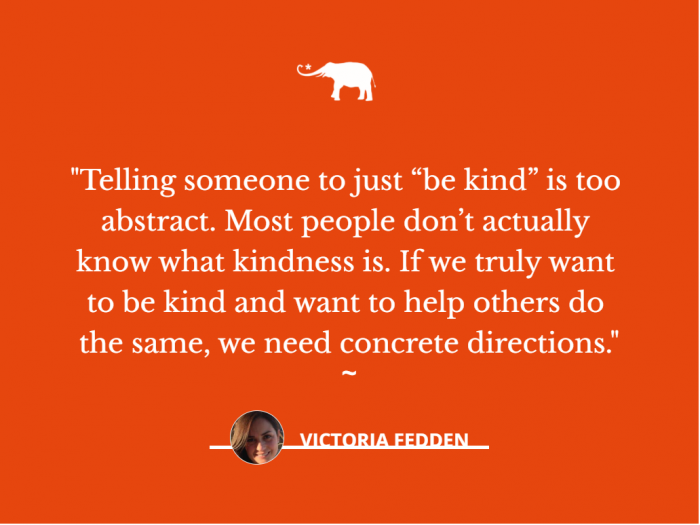The other day on the way home from work, I passed a chain-link fence into which some well-meaning soul had spelled the words “Be Kind” in red, solo cups.
I see these words all over the place. Everything from coffee mugs to wall decorations, bumper stickers, and T-shirts is reminding us of the importance of kindness.
But more often than I see public messages reminding us to be nice, I witness people behaving horrifically to one another.
Cruelty occurs in interpersonal relationships, in family dynamics, at work, in our government and its policies, and (especially) online. Publish anything online these days from a simple recipe to an innocuous photo of your baby or cat and see how swiftly the negative and combative comments start rolling in.
So why aren’t all the entreaties to “be kind” and “be nice” doing any good? It’s simpler than we might realize.
Telling someone to just “be kind” is too abstract. Most people don’t actually know what kindness is. If we truly want to be kind and want to help others do the same, we need concrete directions.
Here are some ideas to get us started:
1. There is no kindness without empathy.
Period. Even those of us who think we are already empathetic can still work on strengthening this skill, so start here. Some ways to become more empathetic are by reading or listening to other people’s stories that are nothing like our own experiences, and then imagining how those people feel or have felt.
Explore other worldviews and belief systems. That doesn’t mean adopting them; it just means learning about them and imagining life through another lens and how that might look. Meditate a lot on putting yourself in someone else’s situation.
2. Stay out of other people’s business.
If everyone just did this one thing, the world would be a better place overnight.
Let others make their own decisions regardless of how you feel about them. Make your own choices that are right for you and accept that there is no perfect template for how everyone should live. It’s wildly different for everyone. This goes for spiritual practices, ways of eating, how and whom to love, career choices, parenting styles—pretty much everything.
Instead of interfering, celebrate the array of possibilities for our lives from which we may choose. Even better? Work on broadening those possibilities for everyone rather than limiting them. That’s what freedom really means.
3. Only make fun, positive comments on social media.
Seriously. There’s no reason to criticize others or freak out because someone doesn’t agree with us on something. Move on.
4. Learn to recognize the power structures and systems of oppression in society.
And then start resisting them, especially if they don’t really seem to affect you, or if they give you an advantage over others. This one is huge and it’s difficult because most of us have literally been trained from birth to be oblivious. We’ve also been trained to support and defend these systems, and many of us are very good at it without knowing that we are.
5. Take people at face value.
A lot of conflicts ensue when we ascribe all sorts of hidden motives and meanings to what is most likely innocent behavior.
Since I started working on giving everyone the benefit of the doubt, my relationships have improved and I’ve been a lot happier not ruminating and trying to analyze everything people say and do, which used to make me mad at hypothetical situations that weren’t even happening.
6. Let people go in traffic.
It’s not a big deal. If you are irritable and impatient while driving, leave earlier and manage your time better. Listen to a fun podcast or audiobook or play upbeat music to put yourself in a better mood.
7. Make a “No Gossip” rule.
The misfortunes of others are not for our amusement. It is never “harmless.” While we’re at it, let’s stop supporting any programming or outlet that profits from using complex human lives and people’s anguish as entertainment.
8. Think about people who work in service industries.
Tip generously. Speak to them like they are individuals with feelings instead of worker ants. If they make a mistake, let them off easily or help them fix it by not throwing a fit. Avoid venting your frustration at them. Remember that they have no power to make changes to corporate policies that you don’t like.
9. With every person you encounter each day, mindfully ask yourself this question:
How can I make this person’s life (or day, or job, or whatever) easier? Mostly the answer will be in little things, but in other cases, you might have the power to do something significant. Then, actually do whatever it is.
Nothing is too small. Once you start doing this, the behavior will become a habit. And it will make a difference.
10. Let others make mistakes and grant them some dignity when they do.
No lecturing, no character attacking, no trying to fix their problems.
Some of us need to learn the hard way, and sometimes that takes a few repeated attempts. Love people through their tough lessons, even if it has to be from a safe distance for our own sanity.
11. No shunning, disowning, cutting other people off.
Obviously, in situations of abuse and addiction, we need to dramatically distance ourselves from people who are dangerous. But that’s not what I’m referring to here. Too often, I see people punishing loved ones this way because they don’t like their partner, or they disagree with a decision they made.
Life is too short to punish people like this. Look for common ground instead of reasons for division.
12. Stop being stubborn.
Some of the meanest people are those who double-down. This is a stupid power-play and doesn’t accomplish anything. Admit to your mistakes, be open to changing your mind, concede once in a while, learn to compromise, and move on.
What conviction can you let go of right this second? Drop it right now.
13. Examine the standards to which you hold others, and maybe even yourself.
Are you too harsh? How about granting some leeway and flexibility? This is especially important to do when we’re dealing with children or the elderly. Expecting others to be perfect for us all the time is unreasonable and lacking in compassion. Try listening to them instead of critiquing.
14. Assess your stress levels and physical health.
This is important because when we are anxious and when we don’t feel good, we can be nasty and horrible to be around. Therefore, it is our responsibility to take care of ourselves by finding ways to relax and making sure that we have eaten, rested, and hydrated.
If we ignore our bodies and then treat others unkindly as a result, that’s on us and we need to fix it. That means we might need to seek therapy and/or medication if the problem is bad enough.
15. Stop “othering.”
Kindness means being kind to everyone.
I know a lot of people who are quite “kind” to people in their own tight-knit groups. They can be loving and generous and show up for those who are just like them. But that’s it. Those “other” people are lazy, uncouth, are taking their jobs, sucking off welfare, trashy, deplorable, and the list goes on.
Everyone deserves the same kindness. When we “other,” we are denying our human connection and sowing division. A person who does that cannot truly be considered kind.
Telling people to “be kind” is easy, but practicing real kindness can be difficult.
It takes a lot of self-awareness and honest reflection. Learning to be kind is a process. Sometimes we may miss the mark, but remember that all of our acts of kindness, no matter how small, will add up and make a difference, even if we don’t see it.
It is our individual and collective responsibility, though, to do the work and create a kinder society.
So let’s start right now.













Read 4 comments and reply